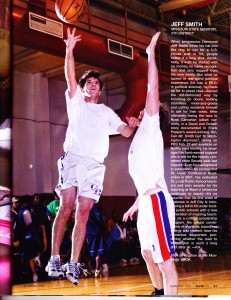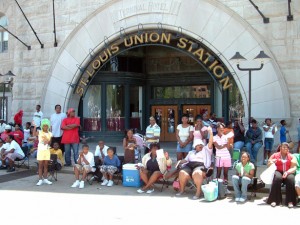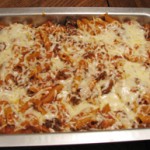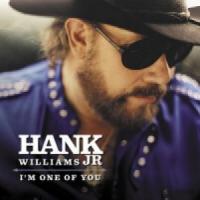The recent attention to local and national politicians’ racial gaffes reminds me of my own.
As readers may be aware, politicians have lately dredged up one of the ugliest aspects of our nation’s history: slavery and the subsequent century of brutality and discrimination. Haley Barbour has often tripped himself up, beginning with his 1982 watermelon comment. More recently he’s praised the ignominious Citizens Councils and declined to condemn a proposal to venerate Confederate war hero and founding KKK Grand Wizard Nathan Bedford Forrest with an honorary license plate.
Former Virginia Sen. George Allen of “macaca” fame had another recent gaffe, where he twice (erroneously) assumed that a tall black reporter was an athlete. Even the ever-poised Alex Trebek may have slipped up.
Closer to home in St. Louis were the comments of State Sen. Maria Chappelle-Nadal, who compared the black state legislators opposing her on a bill – that is to say, all of them – to “house slaves.”
***
I spent years walking a racial tightrope in city politics. I represented a district that was roughly 55% black, 6% Asian, 5% Bosnian, and 4% Latino. Since it was also estimated to be 15% gay, the percentage of straight white males like me was likely in the single digits.
Not that I minded. I actually found it exhilarating. At first.
See, I’d grown up in a mostly white, middle-class suburb, but about 10% of my graduating class was comprised of black kids bused from the city as part of a school desegregation program. By my senior year, they comprised most of the basketball team, and as point guard, it was my job to lead the team.
My co-captain once told me that when he came out to our school freshman year, he was three years behind us academically. That pissed me off. It also made me want to learn more about the history behind the inequity. So at UNC-Chapel Hill, I majored in African-American Studies.
Conservatives like to invoke the guilty white liberal. I wasn’t guilty as much as obsessed. I wanted to immerse myself in the city’s black community and help black kids get to college.
So I came home from UNC and worked in the city public schools. Frustrated at the system’s dysfunction, I co-founded a charter school whose enrollment was 99% black. I served on the boards of non-profits focused on racial justice and black uplift. I coached basketball for a decade at a boys club where the only white people I saw were the occasional white refs. I taught ACT prep courses for black high school players in danger of becoming Prop 48 casualties. And when I played, it was with strangers in one of the small parks that dotted the corners of the city’s North Side, where the competition was fierce.
The point is, when I jumped in the race for Missouri’s 4th Senatorial District, I felt at least as comfortable around black people as I did around white people.
The problem I discovered is that most black politicos are unlike other black people. Whereas others – the families of my high school teammates, the students I taught, or the kids I coached – had embraced me and supported my candidacy, black politicos did not embrace me. In fact, not only did they oppose me, some said that I had no business running in a black-majority district. One black citywide elected official called me and asked me to abandon the race. And an aide to the area’s black congressman told me that if I came canvassing in his ward, I better bring security: “Cause what they do to you ain’t gonna be pretty.”
That’s when it started feeling like walking a tightrope.
***
In Home Style, my favorite book from graduate school, political scientist Richard Fenno argued that the essence of retail campaigning is a candidate’s attempt to communicate a simple message to voters: “I am one of you.” Once, in attempting to do just that, I fell off the tightrope.
 The Annie Malone Parade was the state’s largest, attended by over a quarter million black people from throughout the region. I arrived to find that while several alderman had a fleet of SUVs or pickup trucks with pulsing sound systems and oversized banners – the truck beds overflowing with hundreds of supporters – my entourage consisted of two fifty-something volunteers, Jo Perkins and Retta Crawford. They had a small, tattered campaign banner, but no stickers, no car, no megaphone. I was running to represent 700,000 people, and the candidates seeking to serve 12,000 people all had far more impressive displays of support than I did. Retta and I were the only white people in miles.
The Annie Malone Parade was the state’s largest, attended by over a quarter million black people from throughout the region. I arrived to find that while several alderman had a fleet of SUVs or pickup trucks with pulsing sound systems and oversized banners – the truck beds overflowing with hundreds of supporters – my entourage consisted of two fifty-something volunteers, Jo Perkins and Retta Crawford. They had a small, tattered campaign banner, but no stickers, no car, no megaphone. I was running to represent 700,000 people, and the candidates seeking to serve 12,000 people all had far more impressive displays of support than I did. Retta and I were the only white people in miles.
Desperately seeking a way to avoid embarrassment, I approached a group of kids tossing a basketball around.
“Yo, lemme borrow that ball for an hour. I’ll give you five bucks.” Stony glares. Silence. I realized I was a white guy in a suit.
“Ten bucks,” I said.
“Bet,” said the kids’ leader. He tossed me the ball in exchange for a $10 bill. I handed Retta my sportcoat, tucked my tie inside my shirt, and started dribbling the ball as the parade began. About a half-mile into the parade, above the rap beats I could hear a teenager in the crowd ribbing me.
“Yo white-bread, you ain’t got no handles. You ain’t shit!”
“You wanna come out here and see?” I shouted.
He jogged out of the crowd and crouched in a defensive position. In quick succession I put the ball through my legs, behind my back in the opposite direction, feigned a forward movement, hesitated, and then performed a crossover dribble that left him lunging in the wrong direction. The crowd howled. Kids started streaming out from the crowd to play “one-on-one” with me. By the end of the parade, there were dozens of kids jogging along with me, dribbling balls, and the crowds roared when we approached. My dress shirt was soaked through with sweat, but it was worth it.
***
Enamored of that reception, we scheduled a 3 on 3 basketball tournament and community fair in the heart of the North Side. One day a few weeks before Election Day, while handing out fliers for the tournament, two of my volunteers were greeted by a man who saw my picture on the flier and vowed, “When the Caucasians take over my city, it’s gonna be a muthafuckin’ bloodbath!”
The tournament drew several hundred players and spectators, and a dozen protestors waving handmade signs with creative alliterations like, “No BBQ, No Basketball, No Jeff Smith Racism!” I asked my former high school teammate, who co-chaired the event with me, if we went too far: was it a mistake for a white guy to serve barbeque and watermelon at a basketball tournament in an all-black area? He nodded at the food line snaking around a shade tree and snapped, “What the fuck you think these people want, mostaccioli?”
I walked over to the protestors and offered them food and drinks, which they gladly accepted. One said he’d been paid $20 to hold the sign for an hour.
I took the day as an indication that black voters were receptive to my outreach.
***
Weeks later, I was out shaking hands in a busy shopping district when a young woman with braids and colorful beads approached me. “Are you Jeff Smith?” she asked.
“I am. It’s great to meet you,” I said. It was the final weekend of the campaign. My image was ubiquitous – TV, mail, yard signs. I was being recognized everywhere I went, and it felt good. “What’s your name? I’d appreciate your support!”
“Oh, I’m not supporting you,” she said tartly. “In fact, I plan to spend every day between now and Election Day telling everyone I know not to vote for you.”
I was stunned. “Can I ask why?”
“Because you think I’m a monkey.”
“What are you talking about?”
“Yeah, you think we’re just a bunch of dumb monkeys who’ll vote for you because you dribble a basketball all slick in our parades. Yeah, I saw what you did. It was the most insulting, offensive thing I’ve ever seen a politician do.”
I flashed back to that day. I’d been so caught up in the crowds’ cheers that I never even considered how some others might perceive me.
“I think you misunderstood,” I told the woman. “I’ve been involved in the black community my whole life. I’ve tutored kids, started a charter…”
“Yeah, I know. And you still think that we’ll vote for anyone who can dribble a basketball. That’s what’s so disturbing.”
“But—don’t you see, it was a parade! I couldn’t give a speech or talk about my views. I was just trying to communicate in the only way I knew how, in the moment…”
“Well I sure got the message. And I couldn’t care less who wins your election, just as long as you lose.”
******
Since I was a child, basketball was a lingua franca for me in the black community. And it was a godsend in prison. Yet during that campaign – having used it as short-hand to say, according to Prof. Fenno’s theory, “I’m one of you” – the fury of a young woman helped me understand the landmines of race in urban politics – and the limits of academic theory.
More importantly, it reminded me of an overarching lesson in politics and life: people interpret the things you do and say through their own lenses. She didn’t see my fancy dribbling through the prism of my decade of volunteer coaching and tutoring; she saw it through African-American eyes in a society that historically allowed black men to achieve success only as entertainers and athletes, dancers and dunkers.
It is a lesson that Barbour, Allen, and Chappelle-Nadal are learning the hard way.











Leave a Reply